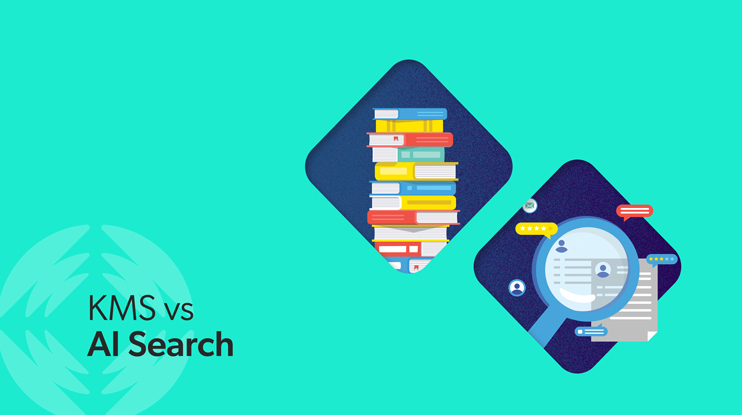If you look into the world of knowledge management software one thing becomes clear: companies are putting more value into knowledge than ever before. But having knowledge, and ensuring that your customers and employees can find it are two very different outcomes. And so many executives are asking themselves:
Do I need an AI search platform to complement my knowledge management system?
More than a fair question, especially considering the many overlaps in functionality. Both solutions are capable of bringing relevant information — personal knowledge, implicit knowledge, explicit knowledge, tacit knowledge — to the agents and customers who need it.
Quick Review: Common Examples of a KMS
- Internal knowledge base software: An employee-facing system that stores and organizes critical company information, policies, procedures, FAQs, and best practices.
- Knowledge management platform: Internal and/or external facing. Goes beyond simple knowledge base functionality by facilitating knowledge creation, collaboration, and accessibility
- Document Management System (DMS): For storing, managing, and tracking electronic documents. Version control, access control, and document search.
- Content Management System (CMS): Primarily for managing website content, but can also be used for internal knowledge management strategy. Think: creating, editing, and publishing various content formats.
- Collaboration tool: These tools or platforms offer features real-time chat, video conferencing, and task management. They facilitate communication and knowledge sharing.
- Learning Management System (LMS): Designed for delivering and managing employee training programs, training materials, online courses, assessments, and performance tracking tools.
Key Differences Between a KMS and AI Search Platform
There are important differences between these solutions, both in terms of how they work with organizational knowledge and the enterprise objectives they support.
1. A KMS is for Creating and Storing Content
Most enterprises use a KMS for authoring, editing, publishing, and organizing knowledge base content. This usually includes knowledge base articles, step-by-step video tutorials, and documentation (among many other forms of knowledge content). Customers, service agents, and partners then navigate the knowledge base to find the content they need.
An AI search platform doesn’t store or generate content. Instead, it brings existing sources of content into a unified search index, which support better findability in a variety of user contexts. An AI search platform solves for findability in ways that a KMS typically cannot:
- Retrieve content from many different sources and repositories
- Tailor search results based on user context in a variety of channels
- Recommend resources based on explicit inputs (intent topics from an IVR, for example, or chat transcripts), or unexpressed customer needs (like the next best question)
- Free up agents to focus on the customer instead of searching for knowledge
- Tangibly boosts efficiency metrics like hold time, handle time, FCR, and escalation/transfer rates
- Offers search relevance, unified index, hybrid search, a suite of AI models, and reporting, thanks to a a full-stack closed loop system architecture
For most enterprises, it’s not an either/or discussion when considering a solution. Leading companies utilize both capabilities to maximize agent and customer effectiveness. Yet some enterprises find that implementing both solutions isn’t necessary: an AI search platform can work with content from almost any source, including structured and unstructured data.
Most enterprises already keep vast amounts of documents and data in various repositories; the challenge isn’t necessarily storing and organizing it (with a KMS), but finding a way to put it to use in the right situations — through a unified, highly relevant experience.
Relevant Reading: What is Knowledge Management in 2024?
2. When it Comes to Search Relevance, a KMS Can Only Do So Much
You can have the best content in the world, but it’s not much use if customers and agents can’t find it in their moment of need. One main problem is that KMS relies on keyword search, and often the keywords that an author (especially a technical one) uses and a typical user searches for are vastly different. Take Trouba*’s example: new agents had to memorize 5,400 jump words, just to get inside of the head of the authors.
Even the best, finely tuned KMS can leave much to be desired in terms of timely, relevant results, one possible reason why 99% of companies struggle to deliver relevant enterprise search results to their users.
On the other hand, an AI search platform continually consumes and analyzes user intent based on history, permissions, and interactions. It combines this understanding with lexical, semantic, and vector-based search capabilities, alongside machine learning (ML) models and analytics. The result is a far more holistic, agnostic, and scalable approach to building relevant experiences that are personalized to the need and desired customer service outcome.
In addition, an AI search platform uses closed-loop learning to continually refine and train its layered ML models with every query and click. As a result, relevance is always improving, which in turn improves handle time, first case resolution (FCR), and customer effort overall. Coveo, considered a best-in-class solution for search relevance by Gartner, Forrester, and IDC, helped Trouba:
- Reduce average handle time (AHT) by nearly 12%
- Save 2.5 days of training per agent with Google-like search relevance
- Achieve 5% reduction in transfer rate
3. AI Search Platforms Open the Door to Generative Answering
Beyond search functionality and recommendations, AI search platforms add in another layer that’s mostly absent from knowledge management systems: Generative AI (GenAI) answering.
GenAI answering provides secure, contextually relevant answers to complex customer questions, saving agents’ time from having to jump through many articles and/or knowledge bases to piece together an answer. In many cases, GenAI can do it for them.
Coveo was first to market with a generative answering capability. It utilized Retrieval Augmented Generation (RAG) methodology, in addition to 17+ search ranking factors, AI, business rules and more, to generate answers only from an enterprise’s domain-specific content.
By offering generative answering, AI search platforms can further enhance the relevance and accuracy of a variety of service channels, including:
- Support portal and community
- Case submission forms
- Blogs, FAQs, product guides
- Mobile app experiences
- Virtual agent/chatbots
- Intranet
Not surprisingly, GenAI represents the next evolution of self-service for many enterprises. Though Coveo has introduced a GenAI solution, few knowledge management systems — if any — have yet to offer this additional layer of relevance.
Relevant Reading: Your Blueprint to Generative Answering in Digital Self-Service
4. For Connected Digital Support Journeys, AI Search is the Answer
The majority of assisted contacts, such as support calls and chats, begin in self-service channels. When they have a question, 70% of customers prefer self-service. Along the way, many customers switch channels, context is lost, and customer effort increases. According to Gartner, 62% of customer service channel transitions are high effort.
An AI search platform can stitch together digital support journeys in a way that a knowledge management tool cannot. For example, it can alert an agent to content that an authenticated user has already viewed, allowing agents to pick up the conversation where the customer left off. This way, customers don’t have to repeat information, or try solutions they’ve already tried.
Beyond service journeys, you can use the Coveo Platform™ to connect the entire customer lifecycle, creating more consistent brand experiences. This can help prospects to discover new solutions, or shoppers to buy products, in addition elevating self-service and freeing up agents to focus on delivering exceptional service.
Relevant Reading: Product Sheet: Coveo for Customer Experience (CX)
Recap: Choose Your Knowledge Management Tools Wisely
KMS and AI search platforms serve different but complementary purposes. Choosing the right tools will depend on your enterprise’s needs and priorities. Many organizations use a combination of both solutions, to create a comprehensive information management strategy — either because they already have a KMS in place, or because it aligns better with organizational strategy.
| Knowledge Management System | AI Search Platform | |
| Focus | Capturing, storing, organizing, and sharing knowledge assets | Searching, retrieving, and surfacing information from various sources |
| Content Types | Structured (documents, reports) and unstructured (emails, videos, discussions) | Almost any (including web pages, files, database records, and Salesforce objects) |
| Content Management | Manual or semi-automated | Automated content classification, tagging, and organization |
| Search Capabilities | Keyword-based search | Advanced search functionalities like natural language processing (NLP), semantic search |
| Personalization | Limited personalization based on user roles or profiles | Can personalize experiences based on user history, preferences, and context |
| Insights & Analytics | Basic reporting on user activity and content access | Advanced analytics to identify any knowledge gap, user behavior patterns, and content effectiveness |
| Implementation | Can be complex to set up and maintain, depending on features | Generally easier to implement and integrate with existing systems |
Modern AI search platforms offer much more comprehensive functionality. The ability to create a unified index, from almost any source of organizational content, is leading many organizations to reconsider just where it is that a KMS fits into their tech stack.
Dig Deeper
Get a detailed analysis of 12 vendors in the 2023 global knowledge discovery software market. This report includes important trends, new innovations in GenAI and LLMs, as well as business implications and use cases.
Relevant Reading: IDC Report: Knowledge Discovery Software 2023 Vendor Assessment




